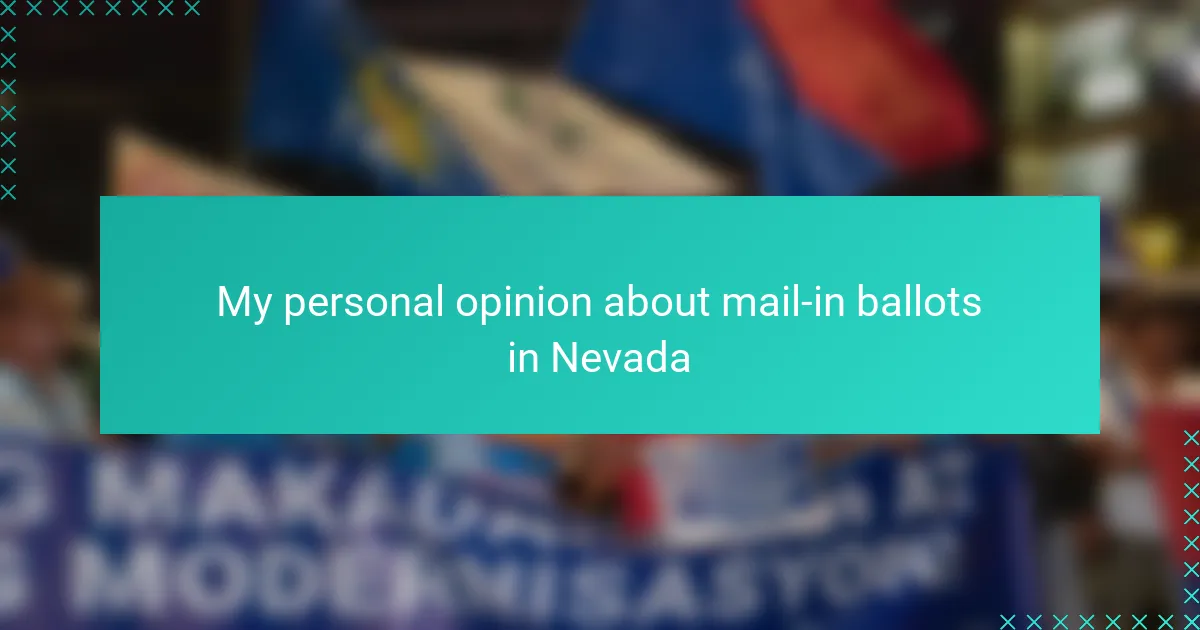Key takeaways
- Mail-in ballots in Nevada enhance voting accessibility and participation, reducing barriers like long lines and transportation issues.
- There are security concerns regarding the mail-in voting process, including the risks of lost ballots and potential fraud.
- Education efforts by election officials aim to inform voters about the mail-in process, fostering trust and reducing misinformation.
- Despite the advantages, challenges remain, such as deadlines and the postal system’s reliability, which can disenfranchise some voters.
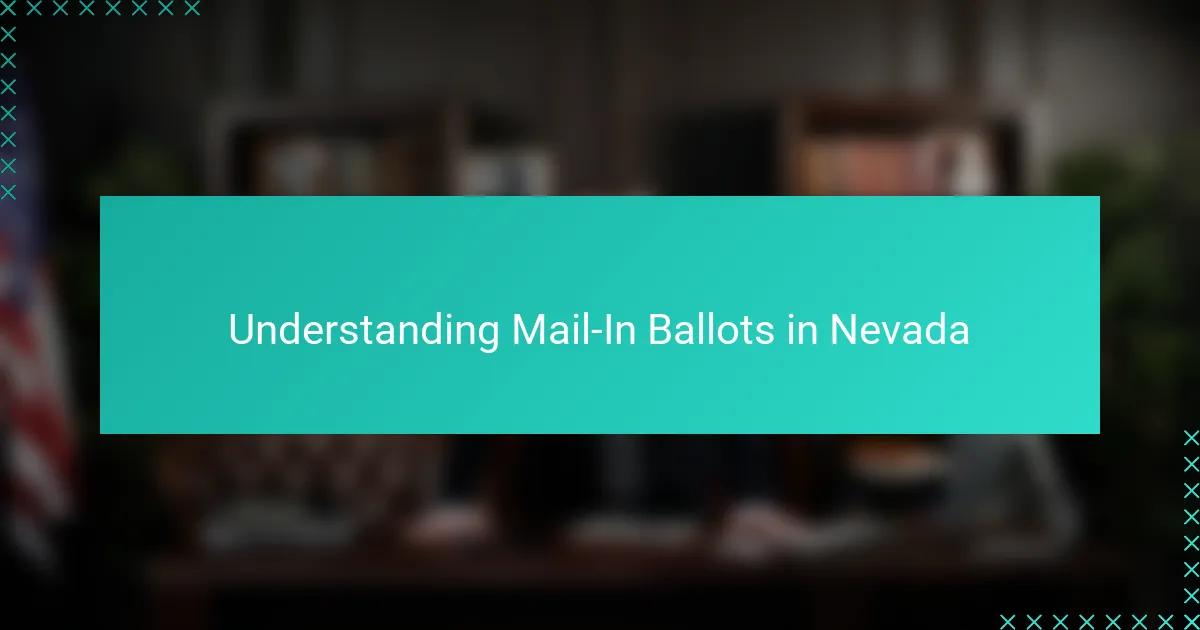
Understanding Mail-In Ballots in Nevada
Mail-in ballots in Nevada have become a significant part of the voting process, especially since the state adopted universal mail-in voting in recent years. From my experience, this system feels like a way to make voting more accessible, but it also raises questions for me about security and trust. Have you ever wondered how a simple envelope can hold so much power in shaping our elections?
What stands out to me is that every registered voter in Nevada receives a mail-in ballot automatically. This convenience resonates with me because it removes many barriers, like long lines or transportation issues, that could prevent people from voting. Yet, I can’t help but think about the responsibility placed on voters to ensure their ballots are correctly filled out and returned on time.
I’ve noticed that Nevada’s election officials put a lot of effort into educating voters about the mail-in process. This level of transparency helps build my confidence in the system, but I also question how often misinformation about mail-in ballots might confuse or discourage voters. Isn’t that an unintended challenge we all need to be vigilant about?
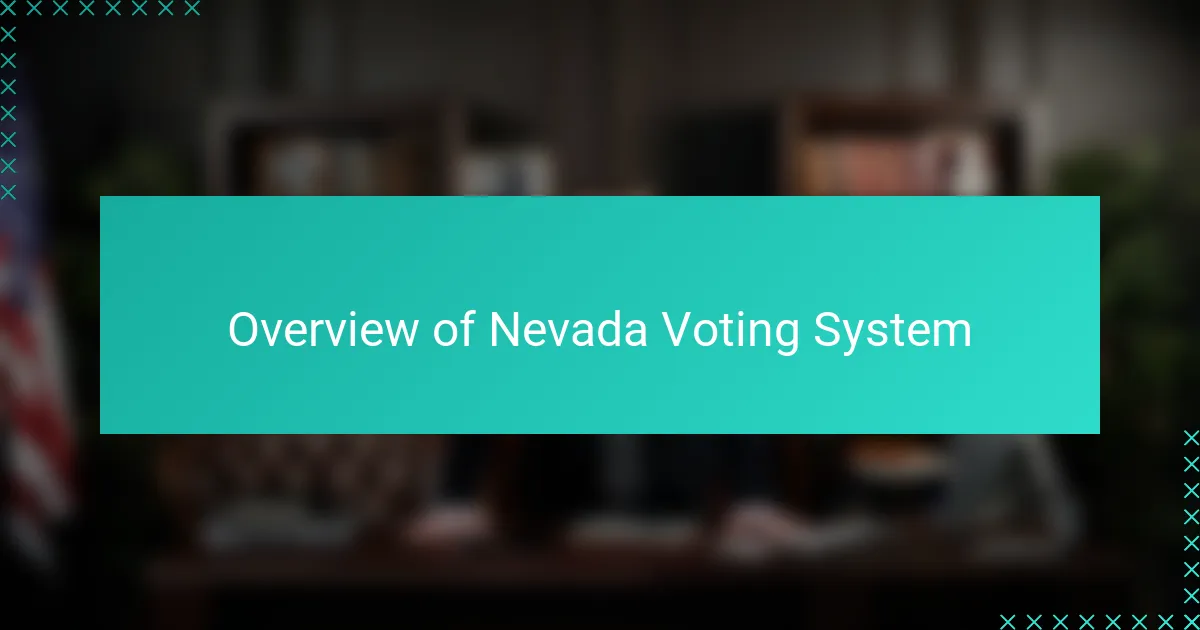
Overview of Nevada Voting System
Nevada’s voting system stands out to me because it blends traditional in-person voting with a robust mail-in ballot program. From what I’ve seen, this dual approach aims to give voters flexibility, letting people choose the method that fits their circumstances best. It makes me think about how adaptable a democracy needs to be in today’s fast-paced world.
When I first learned that Nevada automatically sends mail-in ballots to every registered voter, I found it both impressive and a bit daunting. It’s like the state is saying, “We trust you to participate,” which feels empowering. Still, I wonder how many voters feel the same confidence or if some worry about making mistakes that could invalidate their vote.
I’ve also heard about how election officials in Nevada go out of their way to educate citizens on the voting process, which seems crucial to me. It shows a real commitment to transparency and fairness, and that effort matters because it can reduce confusion—something I believe is key in preserving trust. Have you ever thought about how much work goes on behind the scenes to keep elections running smoothly?
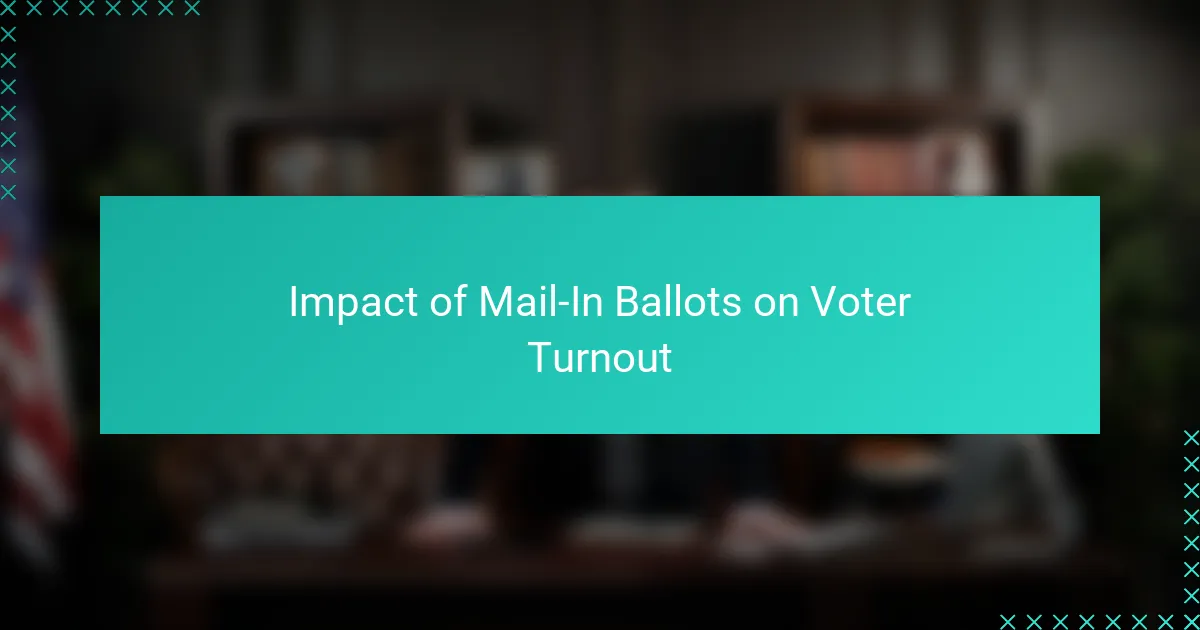
Impact of Mail-In Ballots on Voter Turnout
From what I’ve observed, mail-in ballots have a notable impact on voter turnout in Nevada, often encouraging more people to participate by making voting more convenient. I remember a friend telling me how they used to skip elections because they couldn’t make it to the polls, but with mail-in ballots, they felt empowered to vote from home. Doesn’t that kind of ease seem like a meaningful step toward greater civic engagement?
On the other hand, I sometimes wonder if the sheer volume of mail-in ballots could overwhelm voters or create confusion. Have you ever thought about how filling out a ballot without guidance might intimidate some people, leading them to either not vote or submit their ballots incorrectly? That worry makes me appreciate the voter education efforts even more—they really seem essential in turning accessibility into actual turnout.
Interestingly, data from Nevada suggests a clear uptick in voter participation since mail-in ballots became widespread. This aligns with my belief that removing traditional barriers—like time constraints or travel—can transform the democratic process. In my mind, when voting fits seamlessly into people’s lives, more voices get heard, and that’s something we should all aim for.
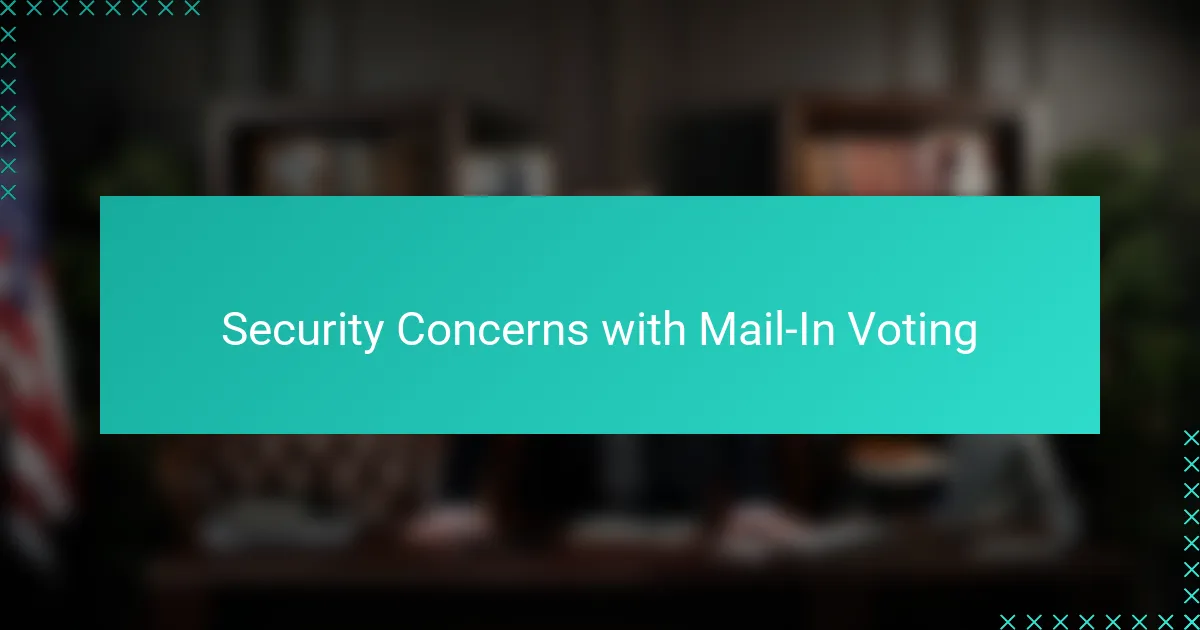
Security Concerns with Mail-In Voting
One thing that often crosses my mind about mail-in voting is the vulnerability it could introduce. While I trust Nevada’s election officials, I can’t ignore the stories about ballots getting lost or delayed in the mail. Have you ever wondered what happens if your carefully filled-out vote slips through the cracks? That uncertainty can make me feel uneasy about the security of the entire process.
I also think about the risks of potential fraud or tampering, even if they seem rare. From my perspective, the challenge lies in balancing convenience with integrity—how do we ensure that every ballot is authentic and accurately counted? It makes me appreciate the layers of safeguards election workers put in place, yet I still find myself questioning if they are enough in a system that relies heavily on trust in the mail service and voters’ honesty.
Then there’s the issue of verifying voter identity without in-person interaction. I recall hearing about strict verification steps, but I sometimes wonder if those measures fully prevent someone from intercepting or submitting ballots fraudulently. Doesn’t that raise the question of whether mail-in ballots, no matter how well-intentioned, inherently carry security risks that we need to address more openly? It’s a tension I feel every time I mail off my ballot.
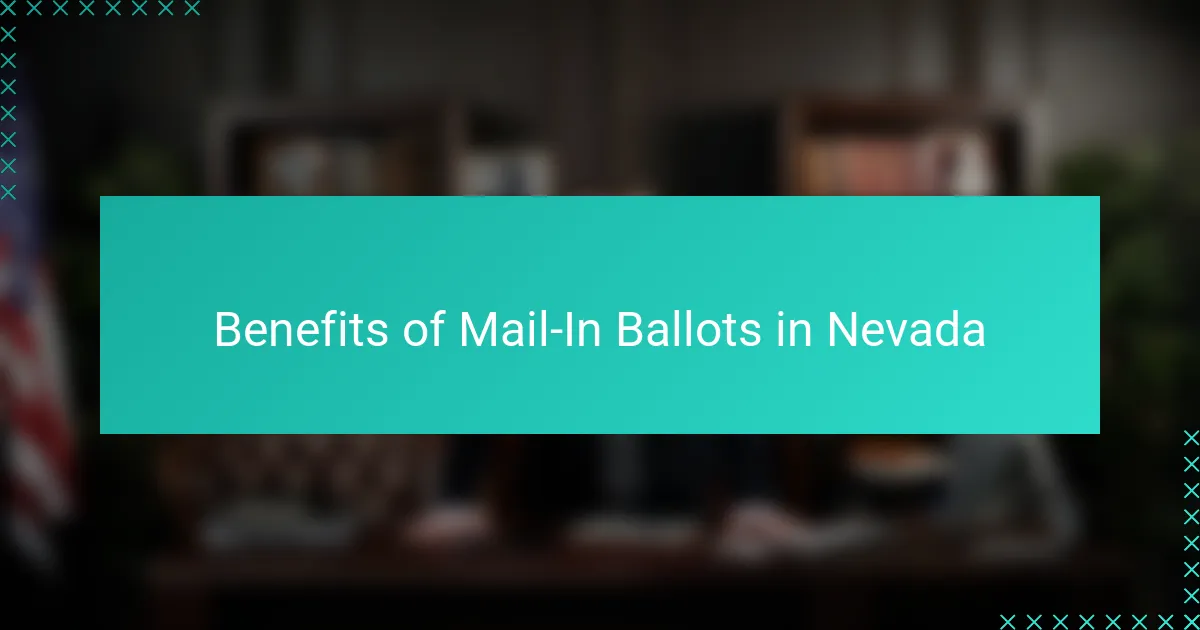
Benefits of Mail-In Ballots in Nevada
One benefit I truly appreciate about mail-in ballots in Nevada is how they make voting accessible to so many people. I think about elderly relatives or busy parents who might struggle to get to a polling place but can easily fill out their ballot at home. Doesn’t that convenience seem like a simple yet powerful way to include more voices in our democracy?
Another aspect that strikes me is the way mail-in voting can reduce long lines and wait times on Election Day. From what I’ve seen, this not only makes the process smoother for voters but also eases the pressure on poll workers. It feels like a win-win that helps everyone involved, especially in a state where rapid growth can put a strain on traditional voting sites.
Lastly, I find the automatic mailing of ballots to every registered voter in Nevada to be a bold vote of trust. It’s almost as if the state is encouraging civic participation by removing extra steps or hoops we might have to jump through. Have you ever paused to consider how empowering it feels to have your ballot arrive ready for you, quietly waiting to be filled out and sent back? That simple gesture, to me, signals a commitment to making democracy as accessible as possible.
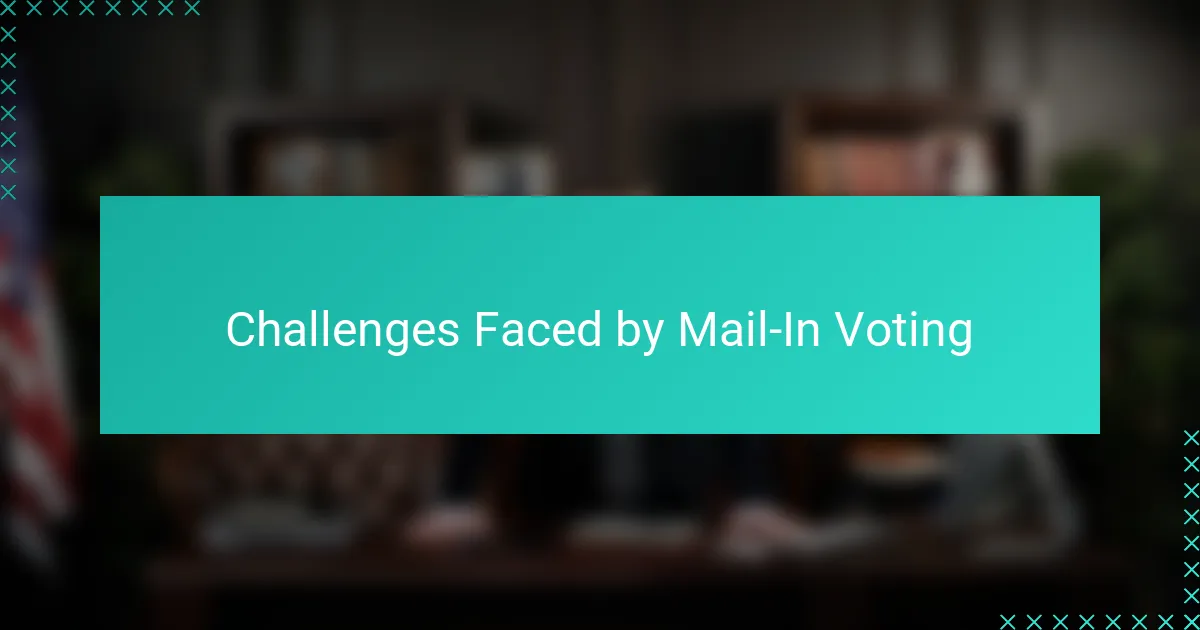
Challenges Faced by Mail-In Voting
I’ve thought a lot about how mail-in voting in Nevada can sometimes trip people up with deadlines and detailed instructions. From my experience, even small mistakes like forgetting to sign the envelope or missing the return date can lead to a ballot being rejected, which feels frustrating—for both the voter and me as someone who values fair participation. Isn’t it challenging when something as simple as a signature becomes the difference between having your voice heard or silenced?
Another issue that nags at me is the reliance on the postal system. I remember a story about a voter whose ballot arrived late due to mail delays, causing them to miss the deadline. That made me realize how this system depends heavily on factors outside personal control, which can unintentionally disenfranchise voters. Have you ever wondered how many votes might never be counted because of mailing hiccups that no one could anticipate?
Then there’s the challenge of accessibility for certain populations, like people with disabilities or those lacking stable addresses. I feel that while mail-in ballots aim to be inclusive, they might inadvertently exclude some voters who face difficulties receiving, understanding, or returning these ballots. It makes me question if the system truly serves everyone equally, or if there’s still work to do to ensure no voice is left unheard.
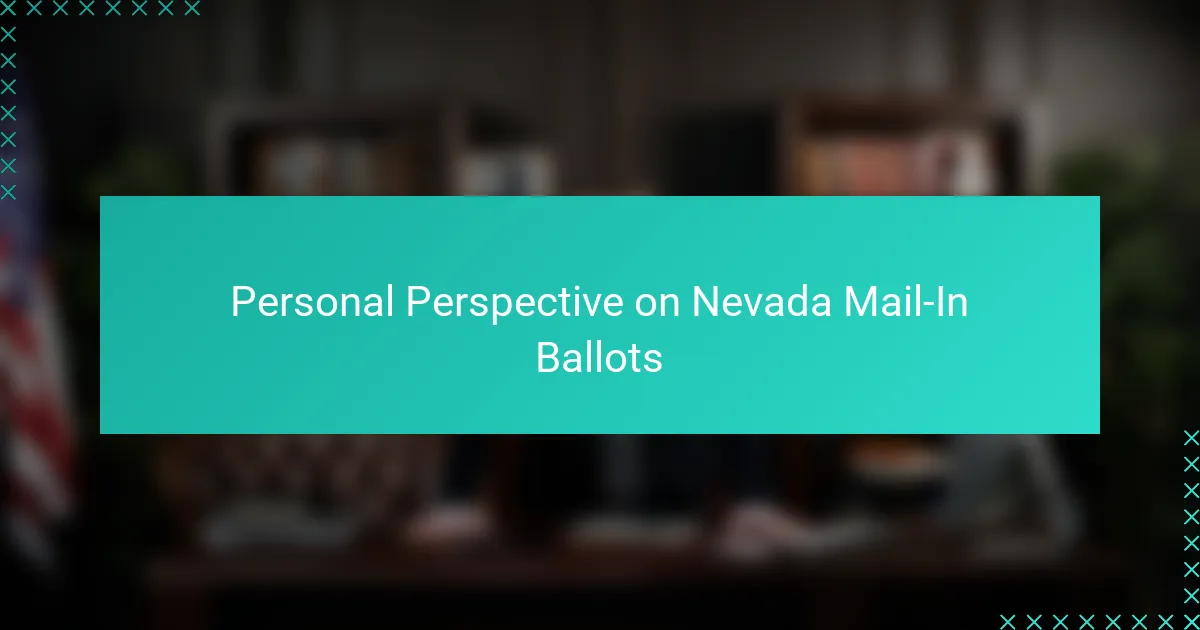
Personal Perspective on Nevada Mail-In Ballots
When I think about Nevada’s mail-in ballots, I can’t help but feel a mixture of appreciation and caution. On one hand, the ease of voting from home feels like a true gift—like being handed the power to shape my community without jumping through hoops. But on the other hand, I sometimes worry whether that same convenience might lead some voters, including myself at times, to second-guess if their ballot made it safely or was filled out correctly.
I remember the first time I mailed in my ballot here; I was careful, almost obsessively so, triple-checking every detail because I wanted to be certain my vote counted. That experience made me realize how much we depend not just on our own diligence but on the system working flawlessly. Do other voters feel that same mix of trust and unease, I wonder? It’s a balancing act that feels deeply personal, as if each envelope carries not just a vote but a little piece of hope and risk.
At the same time, Nevada’s commitment to informing voters reassures me. Knowing there are efforts to explain the process and catch potential errors before ballots are rejected tells me the state values every voice—including mine. Still, I can’t help but ask: is that education reaching everyone equally? From my perspective, mail-in voting holds incredible promise, but it also demands ongoing attention to make sure no one’s voice is lost in transit or confusion.
